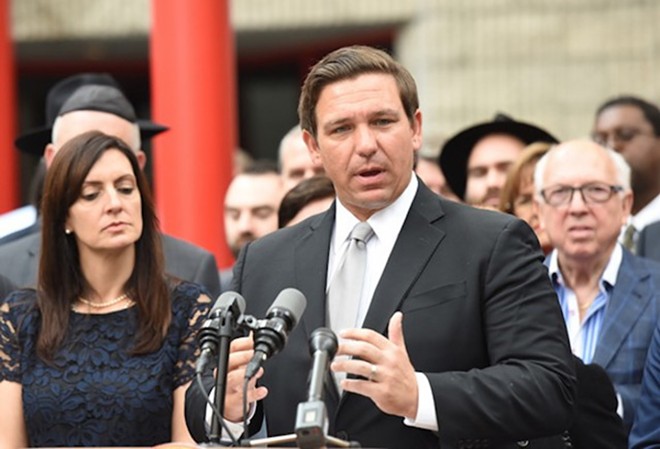Just days after the conclusion of a highly contentious legislative session, advocates with the Florida for All coalition are urging Gov. Ron DeSantis to veto two bills they describe as “predatory legislation” that could negatively affect Florida renters.
One bill, HB 1417, forbids local renter protections or regulations that exceed those granted under state law. For instance, Orange County’s tenant bill of rights ordinance, which gives tenants extra protections against predatory practices by landlords, and the county’s fair notice requirements, requiring landlords to provide at least 60 days’ notice of any rent increase above 5%.
“Safeguards for tenants erased by this state mandate include consumer protections in Naples, Islamorada, Gainesville, Tampa, Hillsborough, and St. Petersburg that simply require landlords to inform renters of their rights,” the coalition wrote in a veto letter, dated May 4 and emailed to DeSantis. “This predatory state mandate is backed by deep-pocketed corporations who continue to inflate rents across the state to profit off of desperate renters,” they added.
Signees of the letter include representatives of Florida Rising, the Florida Policy Institute, the American Civil Liberties Union of Florida, the AFL-CIO and the Service Employees International Union of Florida, among others.
Florida Rep. Tiffany Esposito, the Republican bill sponsor, told legislators that HB 1417 would wipe out an estimated 46 ordinances passed by local governments across 35 cities and counties in Florida. Orlando Weekly sent an email to Esposito’s office last week seeking a list of those ordinances, but has not yet received a response.
The legislation was backed by industry groups that have lobbied against local tenant protections, including the Florida Apartment Association — a group that sued the Orange County government over its plan to cap rent hikes to 9.8% for one year.
That initiative, successfully blocked by the lawsuit, got 59% support from county voters in 2022, equal to more than 225,000 votes.
In a statement after HB 1417’s passage, Orlando Rep. Anna Eskamani called the bill a “slap in the face” to Florida renters, who have faced some of the steepest rent hikes in the nation. A spokesperson for Orange County declined to comment on the bill, telling Orlando Weekly they were not in a position to comment on pending legislation.
Across the state, median rent rose from $1,340 in February 2020, just before the pandemic hit, to $1,760 in February 2022, according to Florida Tax Watch, representing a 31% increase. Although rent hikes have mostly cooled in Orlando, they’re still over 30% higher on average than they were a couple years ago (equivalent to hundreds of dollars), as are the county’s eviction filings.
Metro areas like Orlando, Miami and Tampa have been particularly hard-hit by rent hikes, and Rep. Esposito herself admitted on the House floor that her bill will disproportionately affect urban areas where local leaders have sought to pass local laws giving renters better protection against discriminatory and predatory landlord practices.
Another bill the Florida for All coalition opposes is HB 133, sponsored by Republican Rep. Nick DiCeglie, which allows for landlords to charge tenants nonrefundable, endless fees in lieu of a security deposit — or what critics call “junk fees.”
The bill, backed by companies like Rhino and Leaselock, is similar to one that lobbyists for Leaselock helped draft leading up to the start of the 2022 legislative session, which passed the Florida House last year but was blocked by the Florida Senate.
Based in California, Leaselock is a “prop tech” company that promotes this security deposit “alternative.” It’s behind similar initiatives in other states, likely because it could ostensibly profit from an arrangement that would allow their junk fees to become the norm over refundable, one-time security deposits.
“State leaders should protect consumers from predatory companies, not codify their junk fees into our state law,” Andrea Mercado, Executive Director of Florida Rising, said in a statement following the bill’s passage, in support of Florida for All’s veto letter to DeSantis. “The legislature could have capped security deposits to one month’s rent and required monthly payments into them, but instead, they passed a predatory bill that creates consumer confusion and allows perpetual junk fees for renters.”
Supporters for the bill argued that the security deposit could serve as a cost-saving alternative to deposits that, as it is under Florida law, aren’t capped, and can sometimes amount as much to a full month’s rent or more.
But critics, like Florida for All, warn this isn’t a better option, and that it would instead cause “consumer confusion and [put] further financial burdens as well as risks on renters.”
Both bills were approved by Florida’s Republican-dominated legislature — with Orlando Sen. Linda Stewart being the only Democrat to vote in favor of HB 1417, which is primed to wipe out local tenant protections. HB 133, allowing for “junk fees,” was mostly passed along party lines, with a few Democrats joining Republicans in support of it.
Gov. DeSantis does have veto power, however. Meaning, if he wants to, he could decide to single-handedly reject the legislation, preventing it from becoming law.
Last year, for instance, DeSantis vetoed a controversial bill (resurrected this year) that would have allowed private businesses to sue local governments if they passed an ordinance that’d reduce their profit by 15% within the city or county.
DeSantis has the power to veto only after the Legislature has sent a bill to the governor’s desk for his signature. As of Monday morning, neither HB 1417 nor HB 133 have yet been sent.
Once they are, Desantis has 15 days to sign the bills or veto them, or else they will automatically be approved for implementation upon their effective dates.
A new coalition, Evangelicos for Justice, representing about 2,500 churches across Florida, is also calling on DeSantis to veto a controversial immigration bill targeting undocumented people.


